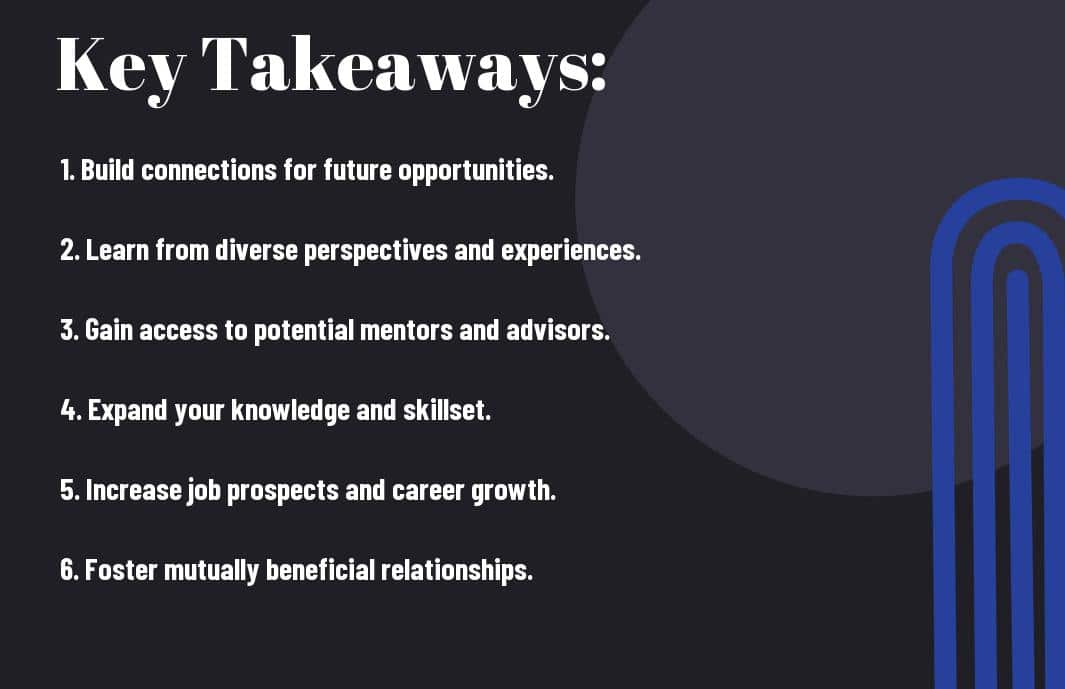You know what’s vital? Networking. Especially in university and beyond, it can make or break your career. Sure, acing exams and getting top grades are crucial, but without a solid network, you might find yourself lost in the sea of job seekers. Networking opens doors, creates opportunities, and helps you stand out from the crowd. From connecting with professors who can write stellar recommendation letters to meeting industry professionals who can offer valuable insights, the power of networking cannot be overstated. Whether you’re a freshman navigating campus life or a seasoned professional looking for new opportunities, remember: your network is your net worth.
Key Takeaways:
- Build meaningful relationships: Networking allows you to create valuable connections with professionals, mentors, and peers who can help you learn, grow, and advance in your career.
- Opportunities for growth: By expanding your network, you open up doors to new opportunities, job prospects, and collaborations that can lead to personal and professional growth.
- Personal branding: Networking helps you build your personal brand, establish credibility, and showcase your skills and expertise to a wider audience, positioning you as a valuable asset in your field.


Building Your Personal Brand
Crush It: Creating a Memorable Persona
With the digital world at our fingertips, it’s crucial to stand out in a sea of faces. Creating a memorable persona involves showcasing your unique qualities, passions, and expertise. Whether it’s through your social media presence, personal website, or even your elevator pitch, make sure you leave a lasting impression on everyone you meet. Be authentic, be memorable, and most importantly, be yourself.
Jab, Jab, Jab, Right Hook: Offering Value First
One of the key principles in building your personal brand is offering value before asking for anything in return. Instead of constantly promoting yourself, focus on providing valuable content, insights, and assistance to your network. By consistently giving more than you take, you establish yourself as a trusted resource and build genuine connections with others.
Plus, by approaching networking with a mindset of giving rather than receiving, you’ll be more likely to receive reciprocal support in the future. Be mindful of, it’s not just about what you can gain immediately, but about cultivating long-term relationships that can benefit you professionally and personally.
Leveraging Social Media
Now, in the digital age, social media has become a powerful tool for networking. Whether you are a student looking to connect with peers or a professional seeking job opportunities, platforms like LinkedIn, Twitter, and Facebook can help you expand your network exponentially. For more insights on networking, check out The Importance of Networking in College.
Dominating the Digital Space
On social media, consistency is key. By regularly posting content, engaging with others, and showcasing your interests and expertise, you can position yourself as a valuable player in your chosen field. Take advantage of features like hashtags, stories, and live videos to boost your visibility and reach a wider audience.
Content is King: Engaging Your Audience Online
For engaging your audience online, focus on providing value with your content. Share your knowledge, insights, and personal experiences to build connections and establish credibility. Ask questions, respond to comments, and interact with your followers to create a sense of community. Bear in mind, it’s not just about selling yourself—it’s about building relationships.
King: To truly stand out online, prioritize authenticity and transparency in your content. Let your personality shine through and show your genuine passion for your interests. By being real and relatable, you can attract like-minded individuals and foster meaningful connections that go beyond surface-level interactions.
Mastering IRL Connections
Crushing Networking Events
Keep your mindset in check when attending networking events. These are gold mines of opportunities, where each conversation could lead to a potential collaboration or job offer. Be proactive, approach people with confidence, and always have a clear pitch of who you are and what you bring to the table. Do not forget, it’s not about collecting business cards, it’s about making real connections that can benefit both parties.
Turning Handshakes into Opportunities
The key to turning handshakes into opportunities is following up effectively. Events are just the beginning; the real magic happens in the follow-up. After the event, make sure to reach out to the people you connected with. Show genuine interest in their work, offer value, and find ways to collaborate. Do not forget, relationships are built on trust and value exchange. Don’t just wait for opportunities to come to you, create them!
For instance, sending a personalized follow-up email referencing something specific you discussed at the event can leave a lasting impression. Express your interest in continuing the conversation and explore how you can work together. Do not forget, the fortune is in the follow-up, so don’t let those valuable connections slip away!
The Art of the Follow-Up
Thank You Economy: The Power of Gratitude
Not just networking, but the art of the follow-up is what sets successful individuals apart. Following up with a personalized thank you message after a networking event can leave a lasting impression. Expressing gratitude shows that you value the connection made and opens the door for future collaborations.
Hustling with Purpose: Staying on the Radar
To stay relevant in the fast-paced world of networking, consistency is key. With each follow-up, aim to provide value to your contacts. Share industry insights, congratulate them on their successes, or offer assistance if needed. By staying on the radar with purpose, you showcase your dedication and commitment to building meaningful relationships.
Hustling in a world driven by connections means always being in the game. Whether it’s sending a quick email to check in, sharing relevant articles or resources, or even meeting for a coffee to catch up, staying on the radar is about keeping that line of communication open. By consistently showing up and adding value, you position yourself as a reliable and respected member of your network.
To wrap up
Upon reflecting on the importance of networking in university and beyond, it is crystal clear that the connections you make can open doors you never even knew existed. Networking isn’t just about collecting business cards or LinkedIn connections, it’s about building genuine relationships with like-minded individuals who can help you grow personally and professionally. Note, it’s not about what you know, but who you know. So put yourself out there, attend events, reach out to alumni, and always be open to new opportunities. The power of networking is undeniable, so embrace it and watch as your network propels you towards success.
FAQ
Q: Why is networking important in university and beyond?
A: Networking is crucial because it opens up doors to valuable opportunities, helps you build relationships with like-minded individuals, and can lead to potential career advancements.
Q: How can networking in university benefit me in the future?
A: Networking in university allows you to connect with professors, alumni, and professionals in your field, which can provide mentorship, internships, job referrals, and industry insights.
Q: What are some effective ways to network in university?
A: Attend career fairs, join student organizations related to your field of interest, participate in networking events, and utilize online platforms like LinkedIn to connect with professionals.
Q: How can networking help me secure a job after graduation?
A: Networking can help you access the hidden job market, where many job opportunities are not publicly advertised. By building relationships with professionals, you increase your chances of landing a job through referrals and recommendations.
Q: Is networking only important for job opportunities?
A: No, networking is not just about finding job opportunities. It also helps you gain new perspectives, learn from others, collaborate on projects, and stay updated on industry trends.
Q: How can I maintain professional relationships beyond university?
A: Stay in touch with your contacts through emails, social media, and occasional meetups. Offer value by sharing relevant articles, job postings, or providing assistance when needed.
Q: What are the long-term benefits of networking in university and beyond?
A: Building a strong professional network can lead to lifelong friendships, collaborations on innovative projects, business partnerships, and continuous personal and professional growth.





